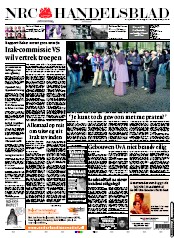
Jag skrev en sorts introduktionsartikel i NRC Handelsblad (for our Dutch readers), om glappet mellan hiphop och DN Kultur, men jag tror inte att någon läste den.
When I first started writing for the cultural section in Sweden’s largest morning daily Dagens Nyheter, in 1996, I often found myself in a position where I automatically felt that I had to defend hip-hop – publicly and among fellow critics. Everything was on trial, it seemed. The music with “no real instruments”; the glorification of violence and the luxury consumerist ideals displayed by the artists; the demeaning lyrics, the presence of semi-naked women portrayed as commodities. The core theme of hip-hop – the Black Male struggling to make his way in the capitalist world – was politically correct within the Swedish cultural establishment that Dagens Nyheter was a key part of, but everything in how hip-hop presented this story was perceived as bad and wrong.
Colleagues, readers and editors would ask me how come a White, middle class girl in Sweden was into hip-hop. How could I identify with Black men in New York or L.A. and what did they have to say about my life?
This question disclosed a widespread idea of hip-hop as the exception and something that could never be of universal application; hip-hop could never really say something general about our common existence. And so therefore it couldn’t really be art and maybe not even popular music. It was Black music.
At the time, I interpreted this view as racist. Sometimes, I still do.
Another common Swedish question was: How can a feminist love rap music? But the way I saw it, when it came to representations of women, there was no real difference between hip-hop and rock music. It was merely a question of which stereotype to pick. And in terms of male predominance I didn’t think that hip-hop distinguished itself very much from the rest of society. For instance, at Dagens Nyheter, I didn’t see any other female critic.
From a feminist perspective, hip-hop is just another male dominated art form, and I believe that a feminist critique of hip-hop needs to take a broader look at art and culture in general.
Ten years ago, the discrepancy between the average hip-hop fan and the average Dagens Nyheter reader seemed to be huge (the hip-hop head then being someone who probably wouldn’t read a daily). Today this gap is less obvious, I think. As a columnist and a writer I grant myself the freedom of not having to choose between addressing ”the hip-hop community” or ”the mainstream”, because they are more intertwined. Hip-hop has reached a “wider“ audience, i.e. the White middleclass, which means that its place in the cultural section of Dagens Nyheter isn’t questioned.

2 comments:
Tja, runt 1995-96 hade väl DN mycket mindre plats för skivrecensioner än de har idag, och mycket färre intervjuer/porträtt över huvud taget med artister som inte redan omfamnats av rock- eller kulturetablisemanget. En stor intervju med t ex Mobb Deep, Janet Jackson, Freeway eller Arch Enemy hade varit otänkbar, oavsett genre. Bevakningen av hiphop och rap i tidningarna (utanför musikpressen) har alltid till stor del varit en fråga om hajp och vad som varit inne, och den här överhajpen bidrog tioll att dränka scvensk hiphop några år efter att Petter, Feven och Ken kommit fram.
När Latin Kings första album kom fick det granna recensioner nästan överallt, trots att det var en ganska snäll skiva och alldeles uppenbart lät som en lågbudgeterad imitation av LL Cool J eller 3rd Bass - men det första "riktiga" svenska hiophopalbumet måste man vara översvallande mot (jag tycker foprtfarande inte att "Välkommen till förorten" är en bra skiva, även om jag numera vet att Dogge och Salla hade sett en del av det de rappade om.) I flera år väntade alla tidningar på den första svenska hiphop-romanen, när "Ett öga rött" kom visade det sig snabbt att den inte hade något speciellt med hiphop att göra. Så kan det bli när man låter hajpen bestämma färdriktningen.
/Diana
Hej Karolina! Tänkte bara säga att din krönika, i DN om Promoe var jäkligt bra! Jag är inne på mitt tredje förhållande nu med en kille, och jag försöker verkligen hårt att förtränga det faktum att han liksom alla andra män (Ja ja det finns några som påstår att de är undantag) varken läser kvinnliga författare, lyssnar på musik med kvinnliga artister eller tittar på film gjord av kvinnor. Jag vill inte vara ensam så därför vill jag inte låtsas om att det är så. Jag var plågsamt medveten om det innan du skrev det, men mina tidigare förhållanden har som sagt kraschat för att jag inte stått ut med det hela. Nu är jag kär igen och vill låtsas om att det kommer att bli bättre. När jag läste din krönika blev jag plågsamt ihågkommen om hur skitverkligheten ser ut.
Det var bra att du skrev det som är sant. Varför ska vi låtsas om att allt är bra, när det är oss själva det straffar.
Post a Comment